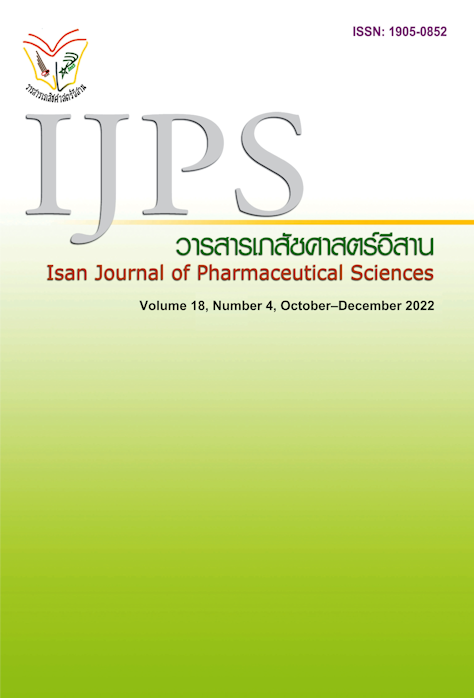Adaptability of First to Fifth Year Pharmacy Students Towards Online Learning During Covid-19 Pandemic: A Survey at Prince of Songkla University, Thailand
Main Article Content
Abstract
The coronavirus (Covid-19) pandemic had greatly affected various aspects of education. A rapid shift has emerged from learning in classroom to distance or online learning. Effectiveness on these platforms depend on the technological skill, individual responsibility, and motivation of the learner. Inability of students to adapt to this rapid change during the pandemic may impact emotional stability, learning outcome and work performance. This study aims to survey adaptability towards online learning of first to fifth year pharmacy students during the Covid-19 pandemic. Methods: The survey used online questionnaires from first to fifth year pharmacy students The data on personal information; the adaptability by The Student Adaptation to College Questionnaire; SACQ (edited and translated by Ms Sopawadee Bunyalittikij, Srinakharinwirot University) with 4 levels of very good, good, weak, and bad; and the opinion of online learning, were collected. Results: There were 263 students, with 59.32% of grade point average (GPA) 3.51-4.00, 55.39% of online learning from home. The proportion that preferred learning in classroom was 42.21% and hybrid learning was 37.26%. The average score of adaptability was 2.71+0.39, at a good level. While the average score of the academic adjustment, social adjustment and personal-emotional adjustment were at a weak level. The percentage of students at good level of overall adaptability, academic adjustment, social adjustment, personal-emotional adjustment, and attachment to the institution were 65.40%, 42.97%, 44.11%, 43.73% and 56.27%, respectively. The overall adaptability of third year pharmacy students was significantly lower than the others. The overall adaptability of students with GPA of 3.51-4.00 was significantly better than the others. Conclusion: The overall adaptability of student was at a good level. However, the academic adjustment, social adjustment and personal-emotional adjustment were at a weak level. There was significant difference for the overall adaptability in level of students and GPA of students.
Article Details

This work is licensed under a Creative Commons Attribution-NonCommercial-NoDerivatives 4.0 International License.
In the case that some parts are used by others The author must Confirm that obtaining permission to use some of the original authors. And must attach evidence That the permission has been included
References
Ananga P, Biney I. Comparing Face-to-Face and Online Teaching and Learning in Higher Education. Mier Journal Of Educational Studies, Trends and Practices. 2017;Vol. 7:165-179.
Arpornkul N, Suppapitiporn S. Adjustment problems of first year medical students. Chula Med J. 2017;61(5):631-645.
Audet ÉC, Levine SL, Metin E, Koestner S, Barcan S. Zooming their way through university: Which big 5 traits facilitated students' adjustment to online courses during the COVID-19 pandemic. Personality and Individual Differences. 2021;180:110969.
Bunyalittikij S. The mental health and adjustment of freshman at Srinakharinwirot [Thesis]. Bangkok: Srinakharinwirot University; 2002.
Cinar M, Ekici M, Demir O. Medication Or Band-Aid? Revisiting University Students’ Readiness For Online Education. TOJDE. 2021;22:176-191.
Demuyakor J. Coronavirus (COVID-19) and Online Learning in Higher Institutions of Education: A Survey of the Perceptions of Ghanaian International Students in China. OJCMT. 2020;10(3):e202018.
Fawaz M, Samaha A. E-learning: Depression, anxiety, and stress symptomatology among Lebanese university students during COVID-19 quarantine. Nurs Forum. 2021;56(1):52-57.
Hyseni Duraku Z, Hoxha L. The impact of COVID-19 on higher education: A study of interaction among Kosovar students’ mental health, attitudes toward online learning, study skills, and lifestyle changes. [Internet]. 2020 [cited 2022, 16 April]. Available from: https://www.researchgate.net/publication/341599684_The_impact_of_COVID-19_on_higher_education_A_study_of_interaction_among_Kosovar_students'_mental_health_attitudes_toward_online_learning_study_skills_and_lifestyle_changes
Khienchanaj T. Factors Affecting Decision To Study Distance Education System At Private University During the Epidemic Of Coronavirus Disease (COVID-19). The Journal of Sirindhornparidhat. 2021;22(1):387-395.
Lertsakornsiri M, Narumitlert J, Samutpradit K. Factors Effecting on Learning Behaviors with Students’ Online Learning in Saint Louis College from COVID-19 Situations. Journal of Health and Health Management. 2021;7(1):13-27.
Ministry of Higher Education S, Research and Innovation. Vigilant measures against the spread of Coronavirus (COVID-19). 3rd edition [Internet]. 2020 [cited 2021, 20 August]. Available from: https://www.ops.go.th/main/images/2563/muaAdmin/corona/COVID_3.pdf.
Ministry of Higher Education S, Research and Innovation. Vigilant measures against the spread of Coronavirus (COVID-19). 15th edition [Internet]. 2021 [cited 2021, 20 August]. Available from: https://www.mhesi.go.th/images/Pusit2021/pdfs/15-AnnCovid.pdf.
Patphayoon C, Lertratdechakul C, Pathanapakdee N. Self-Adjustment Ability of First Year Students in Public University. The Journal of KMUTNB. 2011;21:157-166.
Sahu P. Closure of Universities Due to Coronavirus Disease 2019 (COVID-19): Impact on Education and Mental Health of Students and Academic Staff. Cureus. 2020;12(4):e7541-e7541.
Sansupa K, Kongkraphan U, Sucaromana U, Nantasen P. The Adjustment of Undergraduate Student in Pandemic COVID-9. Journal of MCU Humanities Review. 2020;6(2):83-97.
Selvi K. Motivating factors in online courses. Procd Soc Behv. 2010;2(2):819-824.
Suwimon M. Management Education Online in the NEW NORMAL COVID-19. Rajapark Journal. 2021;15(40):33-42.
Tang YM, Chen PC, Law KMY, Wu CH, Lan YY, Guan J, et al. Comparative analysis of Student's live online learning readiness during the coronavirus (COVID-19) pandemic in the higher education sector. Computers & Education. 2021;168:104211.
Vonderwell S, Zachariah S. Factors that Influence Participation In Online Learning. Journal of Research on Technology in Education. 2005;38(2):213-230.
Zhao H, Chen L, Panda S. Self-regulated learning ability of Chinese distance learners. Brit J Educ Technol. 2014;45(5):941-958.


